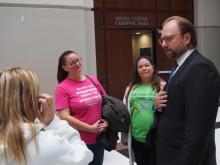
Adam Alson, director of Office of Early Childhood and Out-of-School Learning for Indiana’s Family and Social Services Administration, speaks with Hoosier child care providers after a quarterly fiscal meeting on Wednesday, Oct. 29, 2025. (Photo by Leslie Bonilla Muñiz/Indiana Capital Chronicle)
Indiana will not issue new child care vouchers to impoverished families until at least 2027, Family and Social Services Administration leaders said at a quarterly fiscal meeting Wednesday, in the agency’s latest strategy to contain enrollment — and cut expenses.
“As Indiana looks ahead, the story of 2024 and 2025 will hopefully be remembered as a turning point — a year when policymakers chose to prioritize children and families, even at the cost of short-term strain on child care businesses,” said Adam Alson, director of FSSA’s Office of Early Childhood and Out-of-School Learning.
He spoke from a lectern in Government Center South’s sparsely filled auditorium, prompting scoffs from a contingent of hard-hit child care workers seated front and center.
Alson knocked former Gov. Eric Holcomb’s administration for “overenroll(ing)” Indiana’s voucher programs using temporary pandemic aid, instituting “artificially inflated” reimbursement rates and not planning for a wind-down to normal funding levels.
“We have a responsibility to Hoosier families, Hoosier child care businesses and Hoosier taxpayers to make policy decisions based on the simple constraint of funding,” he said. “We have, and will continue to have, a laser focus on our costs in order to maximize available funding to CCDF vouchers.”
FSSA has cut contracts, staffing and provider reimbursement rates to make ends meet, Alson said. Lawmakers also appropriated $147 million in “hold harmless” funding — enough to renew vouchers for families already on the program and at the same income requirements.
Enrollment in the federal Child Care Development Fund and state On My Way Pre-K programs peaked at 69,000 in December. That month, FSSA closed enrollment and opened a waitlist.
Vouchers have dropped to about 55,000 as of September, according to meeting slides.
Almost 31,000 low-income Hoosier children were on the waitlist for vouchers that month, up from about 29,000 the month prior.
About 80% of those on the waitlist in September were under the federal poverty line, compared to roughly 60% of current participants. New enrollees must meet narrowed income standards.
The 10-month freeze has crushed enrollment, according to the updated figures.

The number of infant voucher-holders — born after the waitlist opened — has dropped 95% since last November, according to the slides. Enrollment for toddlers has dropped 33%, pre-schoolers 14% and school-age children 8%.
Alson’s office projects that it will not take CCDF voucher hopefuls off the waitlist through 2026, assuming federal contributions remain flat.
“OECOSL simply does not have the funding available to prudently begin enrollment before that,” Alson told the auditorium.
Vouchers for OMWPK were also curtailed for the current school year, including a cap of 2,500 enrollees that FSSA doesn’t expect will be hit.
After the presentation, FSSA spokesman Marcus Barlow posed questions submitted by meeting attendees about the waitlist, funding, rate-setting and more.
Asked how much money is required to open the waitlist, Alson replied, “We need to be at a point, as an office, that we feel comfortable in — let me take a step back.
“What’s happened here, in the last year, with OECOSL, can never happen again,” he said. “We cannot be so far off what we enroll versus what our funding is. It just cannot happen again.”
There’s one small exception, according to FSSA spokesman Tyson Runkle: Indiana Code requires the office to provide vouchers for 200 foster children.
Providers complain the enrollment freeze and double-digit rate cuts threaten their livelihoods — 23 locations have closed since June, per the slides — and the care of low-income children.
Dawn Justice, owner of A New Dawn Daycare in Clark County, told the Capital Chronicle that she hasn’t raised rates since 2012. In the auditorium seat next to her, Mary Rudolph, owner of Where Kids Count Childcare in Floyd County, said she’s made no hikes in 21 years of business.
The pair drove two hours to attend Wednesday’s meeting. Justice said it’s a “burden” on families to offset the rate cuts. Parents are responsible for paying the overage — the difference between the rate providers charge and the reimbursement they receive from the state.
FSSA cut rates 10% for infant and toddler care, 15% for preschoolers and a whopping 35% for school-age children. The rates went into effect Oct. 5, with the first pay date being Nov. 6.
Several child care providers confronted Alson outside the auditorium, after the presentation.

He defended the office’s changes, repeatedly noting that it can only spend what’s appropriated, during a conversation lasting at least 10 minutes. As the minutes ticked past, tempers flared.
“Why are you against us? It feels like you’re against us,” said Kelly Dawn Jones, owner of Love Your Child’s Childcare in Marion County. “Why does it feel like you are against the people who truly — we’re literally out here ready to fight for the children.”
She said she has kids at her facility staying for free, essentially, like a child whose voucher paid out just $4 even though it used to provide $120.
Jones continued until Alson interrupted, saying, “I need to go. I thank you for your time.”
As the incensed providers accused him of not caring, he repeated his thanks and departed.
By
Leslie covers state government for the Indiana Capital Chronicle with a focus on infrastructure, transportation and elections. She previously covered city-county government for the Indianapolis Business Journal. Leslie has also reported on local, national and international news for the Chicago Tribune, Voice of America and more. She holds an undergraduate degree in journalism and political science from Northwestern University.
